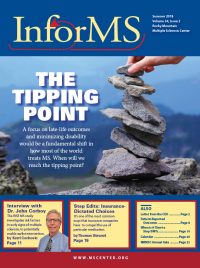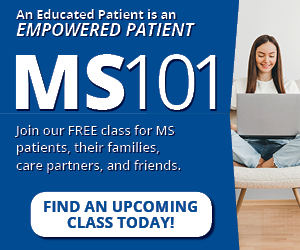Medical appointments tend to be too short to address all our concerns and care does not always feel patient-centered. In an effort to reme-dy these common experiences and give patients a voice, the Rocky Mountain MS Center at University of Colorado (RMMSC at CU) employs a unique program: Patient Reported Outcomes (PROs).
The RMMSC at CU invites all patients with appointments to complete questionnaires—available on iPads in the clinic and sent out by email — about their quality of life. This self-assessment program helps providers recognize quality-of-life changes over time, making patients’ concerns central to their ongoing care. The program also helps providers to recog-nize and analyze similarities or differences within the patient population as a whole.
Patients coming into the clinic are asked to fill out questionnaires that cover quality-of-life factors such as depression, anxiety, cognition and mobility. Their initial answers make up the baseline data—which will be used as a comparison for later responses—and will provide a picture of quality-of-life trends in the patient population overall.
Using that information, the MS Center team will develop educational tools, which patients will receive based on their responses. If patients report fatigue, for example, educational resources with techniques for alleviating fatigue—such as videos and articles— can be sent to them. Tailored education is one of many unique aspects of the PRO program that will revolutionize health care and give patients the opportunity to drive their own care.
The RMMSC and RMMSC at CU recently partnered on a Wellness Pilot Program, with support from the Jimmie Heuga Foundation for MS. This pilot program sought to measure the impact of wellness interventions – active lifestyle, healthy eating, and emotional empowerment strate-gies and education. Using the PRO assessments, we were able to track outcomes of pilot program participants on 17 different assessments—including fatigue, balance, physical and mental outlook, depression, and anxiety. The majority of these outcomes showed improvement in pilot participants, when comparing initial assessments to assessments conducted at the end of the wellness program.
“PROs are part of the future of medicine and a field that has been progressing for the last few years, but not very rapidly. Medicine, unlike most other businesses, has tended to focus on physicians’ opinions. We’ve learned that what physicians and patients think is best is not always the same,” explains Dr. Timothy Vollmer, RMMSC Medical Director and RMMSC at University of Colorado.
The RMMSC has already collected approximately 2,000 initial patient responses and 500 longitudinal responses. We hope to see a significant increase in longitudinal responses over time.
“PROs will make us more aware of exactly what patients are experiencing and what’s important to them, which will help us provide the best possible treatment strategies and outcomes,” says Dr. Vollmer. “PROs are a way to rapidly assess a broad field of symptoms and identify the most problematic.”






